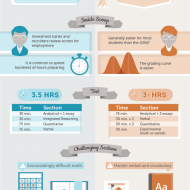Posted by Managementguru in B-Schools, How To
on Jul 2nd, 2015 | 0 comments

Overall MBA Application #strategy: Average scores are creeping higher every year at the top MBA programs, making it hard to offset a bad GMAT score. Timing and planning are key to reducing the stress of the application process. Since both GMAT and GRE scores are valid for five years, getting the exams out of the way years in advance would free you to focus on all of the other elements of the application. If, like most applicants, you didn’t have the foresight to take the exam right after college, the next best step is to plan your application strategy so that the GMAT is finished before you finalize your list of schools. Your score isn’t everything, but it is an important part of the admissions equation. For whatever MBA admissions round you’re targeting, your target date for taking the GMAT should be at least two months before your first application is due. The deadline for taking the GMAT will vary dramatically depending on the admission procedures of each school to which you apply, and the term in which you are planning to enroll. Keep in mind that you can take the GMAT up to 5 times, but never more than once per calendar month (including a month in which you cancel your score), even if you have cancelled your score. Most applicants devote at least 100 hours to test preparation, and depending on where you are in the process, you may have to take a prep class and perhaps take the test more than once. If this is the case, the first round may not be a realistic option unless you’re able and prepared to completely immerse yourself in the process. A1 Applications usually open in the summer, but start thinking before then. It’s never too early to start planning! How to avoid mistakes in MBA applications? From disorganized resumes to poorly written personal statements, there are a number of mistakes an applicant can make when applying to business school. With some guidance, though, they can avoid these pitfalls and stand out from other prospective students. Many applicants turn to admissions experts for help and advice on which admissions round to enter, how to get strong letters of recommendation and what to say during an admissions interview. “Whether you’re a star candidate or an average one, you can play up your best qualities.” You just need to understand what it is about your background that will make you the best possible candidate – and then prove it clearly in your application and interview. Your resume needs to tell the story of the ‘real’ you – the person behind those #GMAT scores and that work experience. So don’t pretend to be the perfect MBA candidate. For one thing, that person doesn’t even exist. An MBA admissions officer at a leading US business school says the most common error she sees is applicants who are “trying to be someone they are not, and trying to impress the admissions committee.” GMAT scores: Stanford University had the highest average GMAT score for incoming full-time students in fall 2014, according to data submitted to U.S. News. Below are the 10 business schools with the highest average GMAT scores for incoming full-time students in fall 2014. Business school Enrollment (fall 2014) Average GMAT score B-School rank Stanford University (CA) 410 732 1 University of Pennsylvania (Wharton) 859 728 3 Harvard University (MA) 935 726 2 University of Chicago (Booth) 583 724 4 New York University (Stern) 344 721 11 (tie) Yale University (CT) 323 719 13 (tie) University of California—Berkeley (Haas) 241 717 7 Columbia University (NY) 743 716 8 Dartmouth College (Tuck) (NH) 281 716 9 University of...


